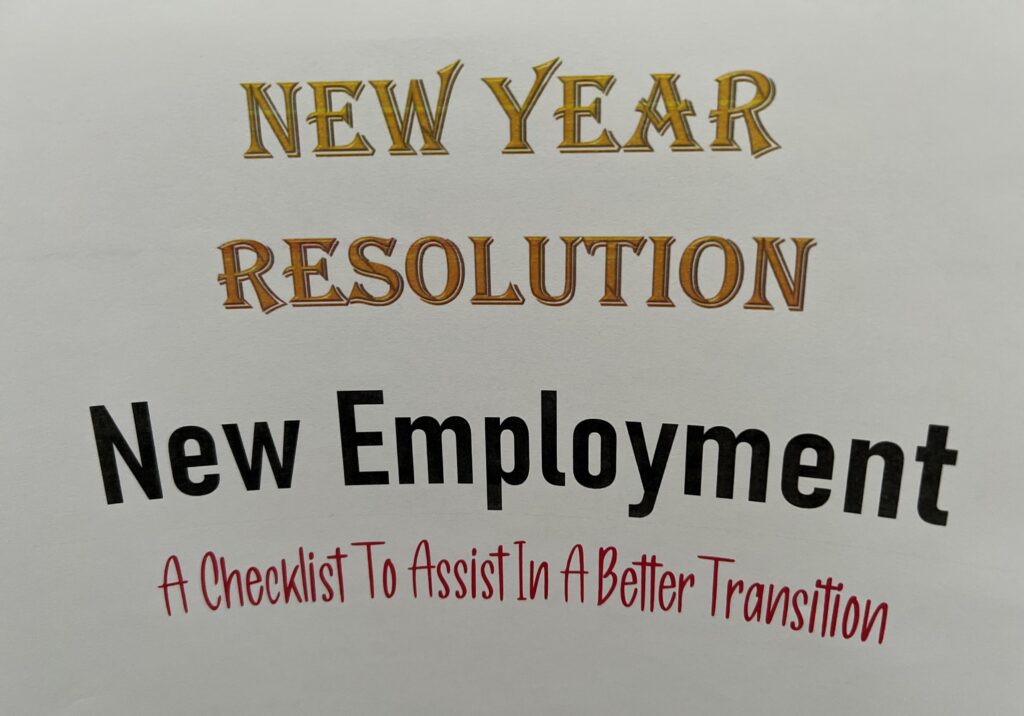Your New Year Employment Checklist – Things to Consider Before Taking Action
It is the New Year and as part of your resolution you have decided you are going to be happy with your job. You are determined to find a job that values you and rewards your hard work.
If you are considering resigning from your current job and transitioning to a new job, we suggest that you consider the following checklist below:
(1) Gathering all of the policy, plans and handbooks of your current employer, to determine your rights and obligations.
(2) Have you obtained new employment prior to giving notice of resignation? If so, has this new employment been finalized, including whether you have come to agreement on, among others, your title, location, job responsibilities, salary and bonuses, and benefits and have these been placed into writing to confirm these terms? Have all of the background checks and any and all other contingencies of your starting work been met? Do you know if you have to sign any additional documents, like a Non-Compete Agreement, after you commence employment? Have you received a copy of their policies and handbook? Does this new job offer you the opportunities you are looking for and that you were not getting at your current employer?
(3) If you do not have new employment lined up, do you really want to resign at this time? Keep in mind that resigning without good reason may prohibit you from obtaining unemployment benefits. It may also be harder to get a new job if you resign from your job without first having new employment secured, as you appear more valuable when you are employed.
(4) Are you due to receive a bonus from your current employer? If so, when is this supposed to be paid to you? [You may want to give notice of resignation after the bonus is received as most plans require you to be employed on the date bonuses are paid in order to be eligible to receive them and if you give notice before this date, you may be asked to leave immediately, and therefore would not be eligible to receive the bonus].
(5) Are you due to vest in any stocks, equity plans, deferred compensation, retirement plans? If so, when is the vesting date and how will your giving notice of resignation affect your vesting?
(6) Have you signed a Non-Compete Agreement, Non-Solicitation Agreement, Non-Disclosure Agreement, Confidentiality Agreement, Inventions Agreement, or any other agreement that may restrict your ability to obtain or perform at a new employer? Are you subject to garden leave? If so, do you have a copy, understand what you signed and have you shared these restrictions with the new employer so they are aware of your current obligations?
(7) Do you know how much notice you must give if you are going to resign? Will you be giving notice of your resignation in writing? If so, will it be short or is there a reason you are departing?
(8) Are you entitled to payment of accrued but unused vacation days or PTO time if you resign?
(9) Are you due any payments you have not yet received; i.e., expense reimbursements, quarterly bonus, commission payments, etc.
(10) Have you taken home your personal property or removed personal items from the company computer? Alternatively, have you made a list of your personal items in your office or at your desk? Be advised that you cannot print out, take home or delete any customer lists, client information, trade secrets, business plans or other proprietary information of the company. If you are not sure if items are yours or those of the company, you should speak with an attorney prior to taking or emailing any items.
(11) Have you raised any claims against the company that are currently being investigated internally or at a city, state or federal agency?
(12) Is it possible for you to depart with severance?
(13) Prior to submitting your notice of resignation, is there a mentor that you would like to speak with first to advise them of your departure?
(14) Will you have an exit interview and will you be asked to sign anything during this meeting?
(15) Try and depart on good terms as you never know what the future will bring. Thank those who have helped you along the way and do not say or act in a manner that can harm you personally or professionally.
If you are going to transition to new employment, we recommend that you consult with an knowledgeable attorney to understand your rights and obligations and to determine how the above items, plus others, apply to your situation.
We are happy to assist you and guide you to a new and happier workplace! For guidance, job coaching or counseling, assistance with your transition or just more information contact Sheree Donath.
(Attorney Advertising)











